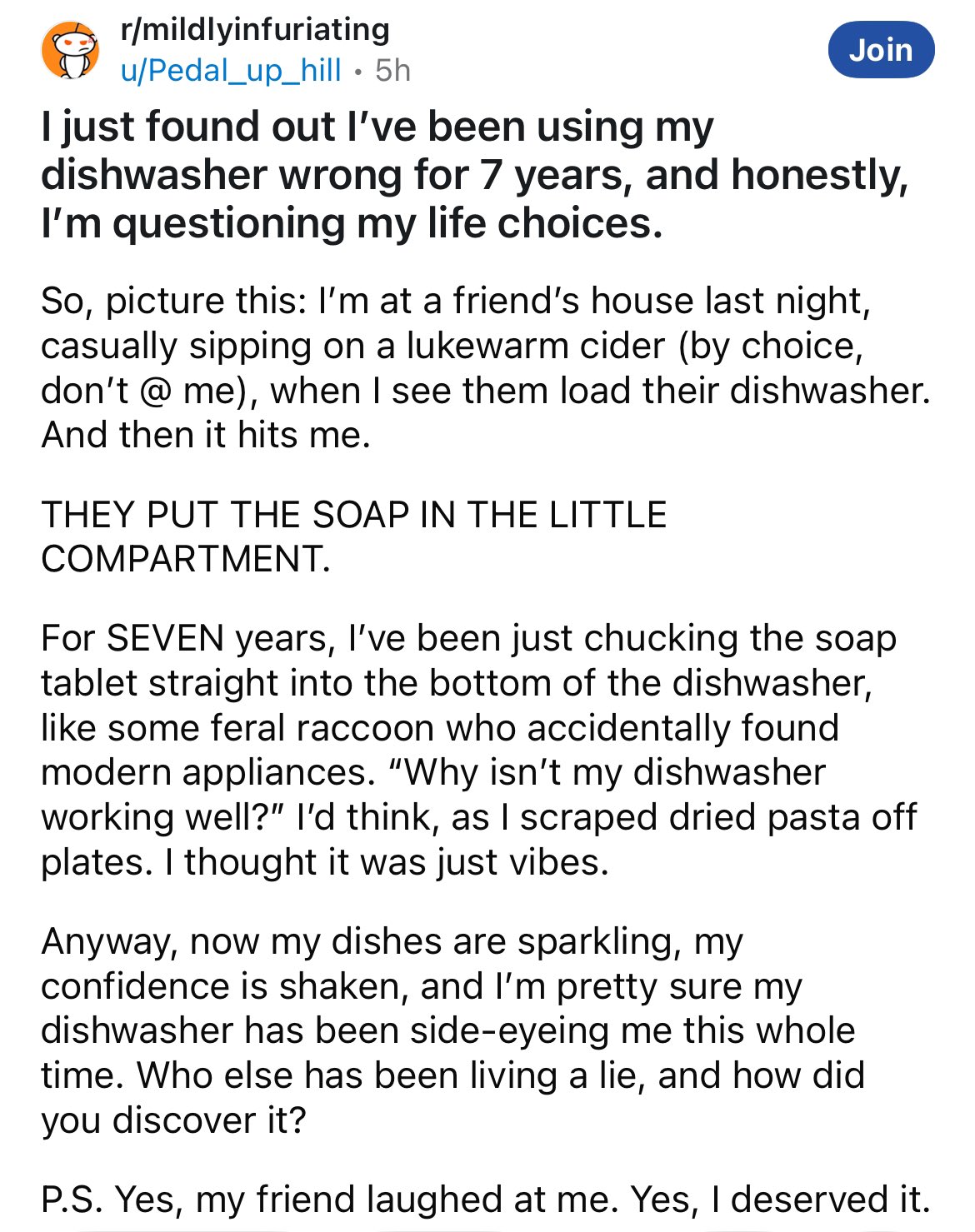I've switched from using the little door to just chucking the tablet in the bottom. Works just as well, if not better.
Facepalm
My wife refuses to load the dishwasher because to her she "doesn't do it right" or "don't want to fight with it"
So I get OP.
I've had to teach people how to mop a floor, and how you should sweep first, it's just deer in headlights when explaining it. People just don't go outta their lane to learn new things or fix things that don't work right.
My dishwasher was caked in that white film that denotes very hard water when I got it. Came with the house. Literally did not clean anything put in it. Found some stuff online called Afresh. Comes in tablet form. Tossed one into the machine ran an empty cycle and now it works like it should
I think you're talking about lime scale.
I'm pretty sure the afresh just descaled your dishwasher.
Many dishwashers have a dedicated spot for a "rinse aid" like jet dry, and I'm pretty sure that is just a prevention method for this exact problem.
IDK, I'm not a scientist or anything.
I'm not a scientist either, but from what I remember from reading the manual; rinse aid helps with drying the dishes, makes it so that water don't stick to them as well. Added dishwasher salt is what helps with lime scale. My dishwasher has a separate salt container, and I then tell the dishwasher how hard my water is and it will add the appropriate amount of salt to the water.
Feel free to correct me if I got it backwards.
Rinse aid is what we call a surfactant. It disrupts the surface tension of water, which in turn lessens its ability to cling to surfaces.
You know how when you get a smooth surface of glass or plastic wet, there will be a lot of beads of water that just cling there and don't go anywhere? Unless they grow big enough to start finally running down the side? That's surface tension in action. Adding the rinse aid will reduce water's ability to bead up like this on dishes. Instead, water will be more likely to run down the surface in unbroken sheets instead of beading up.
The primary intent is that more water will simply drip off the dishes due to gravity. This does make dishes come out dryer after a drying cycle, and/or decreases the time the drying cycle takes or the energy it requires to get the same effect. But the main reason wanting water to drip off of dishes is to prevent limescale on them.
When water evaporates, only the water disappears into the air. Anything that was dissolved in that water gets left behind. If your water is hard, that will mean there's a bunch of calcites that will stay behind as a whitish powder called limescale. So if you wash dishes with hard water, let the rinse water stay beaded up on them, and dry it out via only evaporation, you get some limescale buildup on them in the form of so-called "water spots".
If instead you add rinse aid, more of the water will drip off the dishes, taking all the dissolved calcites with it. Less water has to evaporate, fewer calcites are left behind on the dishes, so less limescale and fewer water spots. Thus why many brands of the stuff show photos of crystal-clear glass on the box. A water-spotted glass will be cloudy and speckled. Rinse-aided glass will--supposedly, anyway--be clearer.
MIL does this on purpose. Fucking grinds my gears - I gave up on preaching that there is a reason for that little closed compartment.
Unfortunately the little door on my dishwasher sticks and won’t open 99% of the time so I have no choice but to chuck the pod in the bottom. It sucks, but my dishwasher works well in every other way and my dishes are clean enough so I’m not spending money on a new one until some other part of it breaks.
